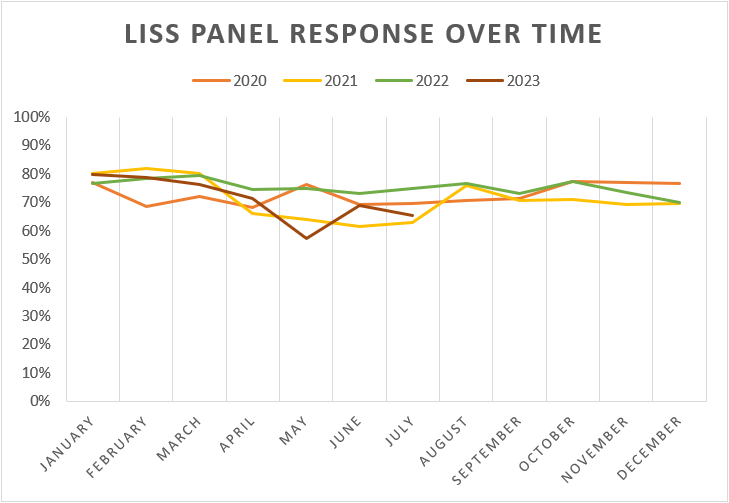
The LISS panel is intended for scientific, policy or socially relevant research. The quality and the coverage of the sample is of prime concern. To establish the LISS panel, a traditional random sample was drawn from the population registers, in collaboration with Statistics Netherlands (Centraal Bureau voor de Statistiek, CBS). This sample includes people without an Internet connection.
Secondly, all people in the sample were approached in traditional ways (by letter, followed by telephone call and/or house visit) with an invitation to participate in the panel. Persons not included in the original sample cannot participate, so there can be no self-selection. People without a prior computer or Internet connection are also able to participate in the LISS panel. These participants are loaned equipment to provide access to the internet via a broadband connection.
A full description of the original sample, the recruitment process and the recruitment response is given below.

The original random sample was drawn in 2007 by Statistics Netherlands and consisted of 10,000 Dutch households. The recruitment of households had a succes rate of 48%, resulting in 8,000 panel members from almost 5,000 households.
The recruitment of a first refreshment sample was carried out between June and December 2009. In cooperation with Statistics Netherlands, we have drawn a stratified sample, intended to improve the representativeness of the panel by oversampling the difficult to reach groups which had a below-average response in the main recruitment. The refreshment sample in 2009 was stratified on three variables: 1) household type, 2) age, 3) ethnicity.
Between October 2011 and May 2012 a second refreshment sample for the LISS panel was recruited. This sample was randomly drawn from the population registers by Statistics Netherlands, in the same way as the original sample of 2007. Between November 2013 and June 2014 a third refreshment sample was recruited (stratified). Between November 2016 and June 2017 the fourth refreshment sample was recruited (again, stratified as in 2009 and 2013) and in 2019 the fifth stratified refreshment sample was recruited. The sixth refreshment sample in 2021, was randomly drawn from the population registers by Statistics Netherlands. The fieldwork of the sixth refreshment sample was conducted between January and June of 2022, due to COVID restrictions. The seventh refreshment sample in 2023 was again stratified.
About 80% of the eligible persons living in the registered panel households participate in the panel [1]. The monthly response of these participants varies between about 50% and 80%, depending on the questionnaire and month. Between October 2007 and February 2010 the monthly response gradually decreased. From March 2010 onwards, it slightly increased again, as a result of special efforts to contact inactive panel members[7].
In 2019 the average individual response to at least one survey per month was 80.42%, with a minimum of 72% in June and a maximum of 87% in March (Standard Deviation = 3.704). The average household response to at least one survey per month was 83.92% with a minimum of 76% in June and a maximum of 90% in March (Standard Deviation = 3.476).

The overall individual response in 2020, 2021 and 2022 was 73%, 71% and 75% respectively.
A study of the respresentativeness of the LISS panel in the first year after its recruitment showed that some specific groups, for example elderly women and non-western first generation immigrants, were initially somewhat underrepresented in the LISS panel [3]. Another study compares the composition of the LISS panel between April 2008 and April 2010 with the Dutch population [4].
The respondent attrition is about 12% per year and the household attrition is 10% per year. Descriptions of which specific demographic groups have especially high or low probabilities to become inactive or to drop out are given by De Vos [5,6].
* The panel members of the Immigrant panel have been completing questionnaires from October 2010 up until December 2014.